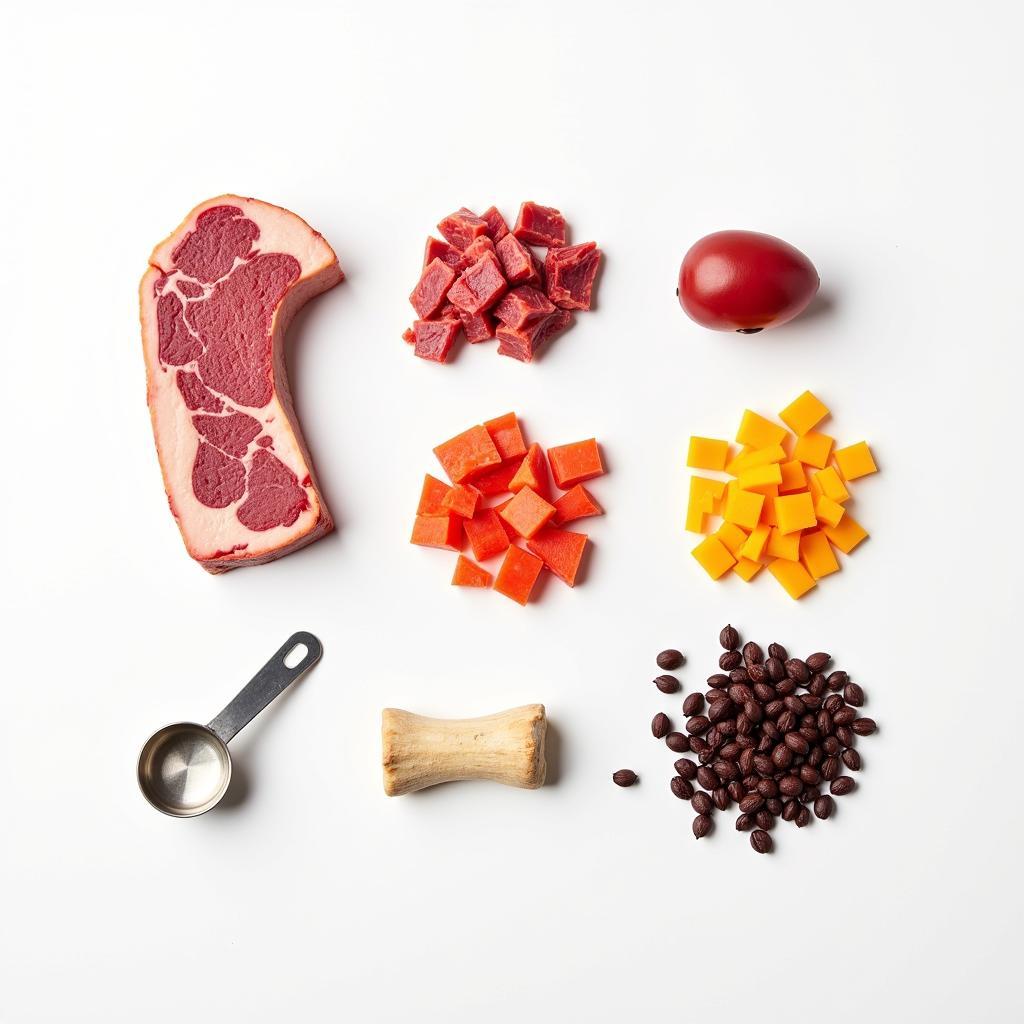Feeding your German Shepherd a raw food diet can be a rewarding experience, offering potential benefits like a shinier coat, more energy, and better digestion. But it’s a big decision that requires careful planning and understanding. This guide will provide you with everything you need to know about transitioning your German Shepherd to a raw diet, ensuring they receive the optimal nutrition for a healthy and happy life.
Is a Raw Food Diet Right for Your German Shepherd?
A raw food diet for German Shepherds typically consists of raw meat, bones, organs, and sometimes fruits and vegetables. While some owners swear by its benefits, others express concerns. It’s crucial to weigh the pros and cons before making the switch. A raw diet can provide a more natural and species-appropriate diet, potentially mimicking what their wild ancestors ate. However, it’s essential to address the potential risks, such as bacterial contamination and nutritional imbalances, if not prepared correctly. Talking to your veterinarian is a vital first step, ensuring the diet meets your dog’s specific needs. You might want to explore other options, such as a balanced diet of whole foods for dogs, which offers a blend of natural ingredients without the risks associated with a purely raw approach.
Looking for a specific blend? Consider N&D Ocean dog food, which is rich in Omega-3 fatty acids, promoting healthy skin and coat.
One crucial aspect to consider is the age of your German Shepherd. Puppies have different nutritional requirements than adult dogs, and a raw diet for a puppy needs careful consideration to ensure they receive all the necessary nutrients for proper growth and development.
Building a Balanced Raw Diet for Your German Shepherd
Creating a balanced raw food diet for your German Shepherd involves more than just throwing some raw meat in a bowl. It requires careful planning to ensure they receive all the necessary nutrients. A typical raw diet includes muscle meat, organ meat (like liver and kidney), bones (for calcium and phosphorus), and sometimes fruits and vegetables. The exact proportions will vary depending on your dog’s age, activity level, and overall health. Consult resources and even work with a canine nutritionist to create a personalized plan for your furry friend.
Don’t forget to consider the unique needs of your breed. If you have a German Shepherd Husky mix, you might want to consider the best dog food for German Shepherd Husky mix to tailor their diet to their specific energy and growth requirements.
 Ingredients for a balanced raw dog food diet
Ingredients for a balanced raw dog food diet
Transitioning Your German Shepherd to a Raw Food Diet
Switching your German Shepherd from kibble or other commercial dog food to a raw diet shouldn’t be done abruptly. Start by gradually introducing small amounts of raw food into their existing diet, slowly increasing the proportion of raw food over several weeks. This allows their digestive system to adapt to the change. Monitor your dog closely for any signs of digestive upset, such as vomiting or diarrhea, and adjust the transition process accordingly.
Common Concerns About Raw Food Diets
Many dog owners worry about bacterial contamination in raw food. While this is a valid concern, it can be minimized by sourcing high-quality meat from reputable suppliers and practicing safe food handling. Another concern is nutritional deficiencies. It’s crucial to ensure the diet is balanced and provides all the necessary nutrients. This can be achieved through careful planning and potentially supplementation, always under the guidance of your veterinarian.
Conclusion
A German Shepherd Raw Food Diet can be a beneficial dietary choice, but it requires careful planning and preparation. By understanding the potential benefits and risks and working closely with your veterinarian, you can make an informed decision about whether a raw food diet is the right choice for your beloved German Shepherd.
FAQ
-
What are the benefits of a raw food diet for German Shepherds?
- Potential benefits include improved coat health, increased energy levels, and better digestion.
-
What are the risks of a raw food diet?
- Potential risks include bacterial contamination and nutritional imbalances if not prepared correctly.
-
How do I transition my German Shepherd to a raw food diet?
- Gradually introduce small amounts of raw food into their existing diet over several weeks.
-
What should a raw food diet for a German Shepherd include?
- A balanced raw diet should include muscle meat, organ meat, bones, and sometimes fruits and vegetables.
-
Should I consult a veterinarian before switching my dog to a raw food diet?
- Yes, consulting a veterinarian is essential to ensure the diet meets your dog’s specific needs.
-
Where can I find reliable sources for raw dog food ingredients?
- Research local butchers and suppliers specializing in human-grade meat.
-
How can I minimize the risk of bacterial contamination in raw food?
- Practice safe food handling techniques and source high-quality meat from reputable suppliers.
For any assistance, please contact us at Phone Number: 02437655121, Email: [email protected] or visit us at 3PGH+8R9, ĐT70A, thôn Trung, Bắc Từ Liêm, Hà Nội, Việt Nam. We have a 24/7 customer support team.